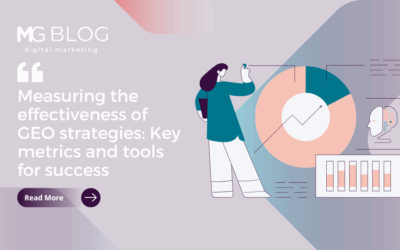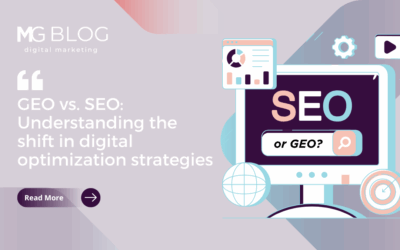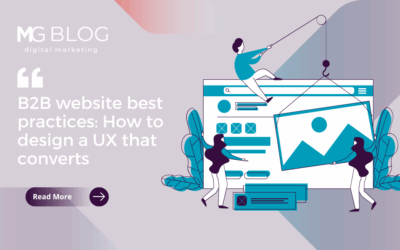
Throughout the B2B marketplace, businesses face a crucial digital marketing question: “Should we invest in an SEM or SEO strategy to generate leads?”
It’s not always a simple answer, and there are certainly benefits to each route. To reach an effective solution, you’ll need to have a firm grasp on your business goals and the search ecosystem you’re looking to conquer.
Additionally, if you’re looking to take on SEM and SEO on your own, or consolidate with a trusted agency, you should know what these terms mean for your B2B business.
Search engine marketing (SEM) in a nutshell
For the most part, the definition of SEM is in the name. It’s a marketing strategy geared towards the search engine landscape. However, there is some debate as to the exact services or tactics utilized.
On the one hand, some would consider the entire suite of search engine marketing strategies as SEM — which may include pay per click (PPC), social media marketing (SMM) and search engine optimization (SEO).
However, most would agree that SEM refers to paid advertising efforts, primarily PPC — so we’ll refer to paid efforts as SEM throughout this article. PPC ads are those that show up first on search engines with an Ad indicator. These are search results that businesses bid on and pay to appear first, and every time an individual clicks on the ad, a business pays a certain amount to the search engine (aka Google).
What about search engine optimization (SEO)?
SEO is all about driving organic search results. While SEM strategies require paid campaigns, SEO looks to capitalize on Google’s algorithms through a wide range of tactics. This may include keyword usage, linking strategies and relevancy. Let’s dive a little deeper.
On-page SEO
On-page SEO is all about web page copywriting and overall design. On-page tactics take into consideration both search engine algorithms and the user experience (UX), especially in regard to copywriting, headlines, subheadlines, page load time, URL structure, content organization and more.
Off-page SEO
We mentioned the importance of linking strategies, and off-page SEO takes full advantage of these to encourage other websites to link back to yours. Earning links to your website from outside content is one of the top drivers of high search engine ranks, but it can take a lot of work and relationship building. Successful B2B SEO marketers must cultivate these partnerships to earn effective links. There’s a lot of strategy in link-building, as you’ll need relevant links (not just any high-authority website) to get results.
Technical SEO
Last but not least is technical SEO, which focuses heavily on web development to boost the user experience on your website. There is some cross-over here with on-site SEO, but technical tactics are far more, well, technical. They include:
- Indexing
- Website crawls
- Site speed
- Overall website architecture
- Accessibility
- UX
- Redirects
- And more
What’s best for your B2B business?
Now that we have most of the basics out of the way, it’s time to focus on how SEM and SEO strategies can help your B2B website succeed. We’re going to look at the pros and cons of each method, along with how your B2B business can harness these tactics to generate leads.
SEM: Pros
SEM is lightning fast compared to SEO, as your current budget dictates the speed at which you’ll see results. You can also catapult your website to the top of Google’s search page for highly competitive terms relatively quickly, weeks vs months. Smaller brands can leverage PPC tactics to compete with massive enterprises.
- Great for fast ranking positions
- Easy to adjust and pivot PPC strategies on-the-go
- Simple to test keywords
- Seamless targeting by demographic, location, time of day, etc.
SEM: Cons
Success in the PPC space is short-lived unless you have the budget to keep it going. It’s a “cheaper” strategy in the short-term, but in reality, it’s going to end up costing more over time. That doesn’t mean it’s not a viable option, as it’s a great way to identify your target market and compete with the big fish.
However, it’s comparable to renting a luxury property. It’s not a very profitable investment, but you’ll have something extravagant to take advantage of while you can still make the payments. On the other hand, SEO is like purchasing a property that you plan on maintaining — and is a much more long-term strategy, in most cases six months to a year, for generating B2B leads.
SEO: Pros
SEO offers a wide range of benefits for B2B business as well, especially if you know your audience. As mentioned, it’s is a long-term strategy that offers continuous results over time, giving your website traffic without paying for every click.
- Cost-effective in the long run
- Long-term returns with solidified audiences
- Easily conquer low-competition (but relevant) keywords
SEO: Cons
SEO is not the go-to strategy if you’re looking for instant results for your B2B business. SEO takes time, and you may not see results for weeks, if not months. While these results will certainly bring you more fruitful traffic over time — if speed is what you’re looking for, SEM is a better choice.
Another potential downside to SEO is knowledge. PPC campaigns are fairly simple and easy to manage, change, and re-target. SEO takes time to set up and run effectively; it also encompasses a ton of back-end work, relationship building, and technical prowess to take full advantage of.

Questions your B2B business should ask
Many B2B business owners wonder which method works best for their company: SEM or SEO. The answer depends entirely on the business’s current state, how well you know your target audience, your budget, and your objectives. Here are some questions that may help clarify which tactic is right for you.
How competitive are my keywords?
Right off the bat, you should identify the value of keywords in your B2B market. If some of the most crucial keywords are incredibly competitive, it may be too expensive to maintain a PPC strategy.
How quickly do I need results?
Speed can be a significant factor in the SEM vs. SEO decision. Here’s where you need to evaluate your lead generation goals and closely. If you’re in need of quick results and leads ASAP — PPC tactics are a must.
However, if you’re looking for ways to build long-term lead generation, SEO is a much better fit if you’re willing to invest. You know the saying: “Slow and steady wins the race.”
Can I do both?
You can absolutely implement a mixture of SEO and PPC tactics to obtain more search engine success. In fact, we would recommend it. B2B businesses are always on the hunt for lead generation, and you can drive traffic through both paid efforts and organic strategies.
You can position PPC campaigns to nail down your audience and receive quick lead generation while also building a long-term plan through SEO efforts.
The next move for your B2B enterprise
In today’s B2B ecosystem, failing to take on search engine tactics means falling behind. Whether it’s through PPC or SEO strategies, your B2B business needs to leverage the ever-growing power of search to generate leads.
Taking on the task of SEM or SEO can be time-consuming, which is why so many B2B organizations rely on agency consolidation to gain every possible edge. Where you may not excel, another organization can succeed — giving you all of the tools necessary to conquer the search landscape.
Learn how Merritt Group’s performance marketing capabilities can help you stay ahead of digital marketing trends and drive leads.
Photo by Lukas Blazek on Unsplash



